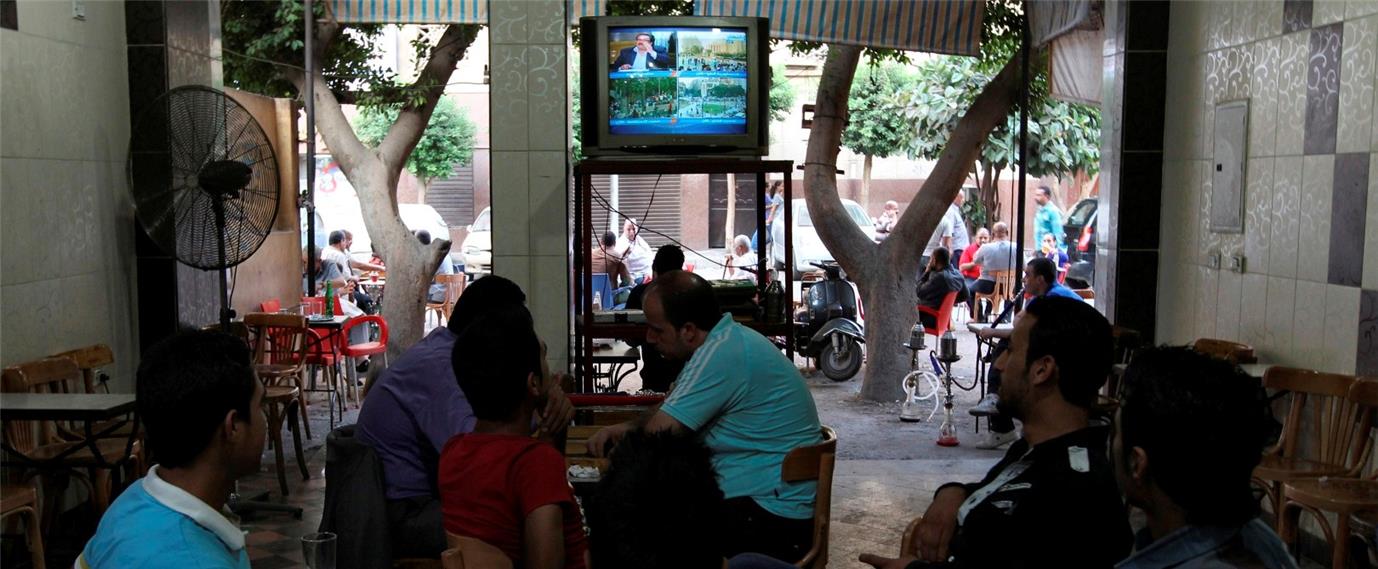فرانك مرمييه أنثروبولوجي فرنسي مختص بالعالم العربي، ومدير أبحاث في المركز الوطني الفرنسي للبحث العلمي (سي.أن.آر.أس)، وسبق له أن كان مدير المركز الفرنسي للدراسات اليمنية، ومدير قسم الدراسات المعاصرة في المعهد الفرنسي للشرق الأدنى. وعلى هامش ذلك، هو صديق شخصي لي، وإن كنا نادرا ما نلتقي. لقيته في المقهى الواقع بجوار بيته عند "سكوار بور روايال" الذي يعرف جميعَ العاملين فيه بالاسم.
فرانك بطبيعته متواضع وعفوي ويكره الشكليّات.. سألني إن كنت صعّبت الأسئلة عليه، فأجبته ممازحا بأن بوسعه اختيار الأسئلة لو شاء، فرد: "سأفعل ذلك فقط إن قبلت أن تتولى الأجوبة عني".. طلبنا فنجانين من قهوة النسكافيه، قبل أن أدير المسجّلة وأفتتح الحوار بالسؤال الملك: منذ 15 عاما، صدر العمل الجماعي "العولمة ووسائل الإعلام الجديدة في الفضاء العربي" تحت إشرافك وإدارتك.. ما الذي استجدّ في الفضاء العربي منذ ذاك الحين، وبخاصة مع النمو السريع للإعلام الاجتماعي؟
"أولا، أحب أن أوضح أن الفضاء العربي ليس مصطلحا جغرافيا، هو يشير إلى فضاء للتواصل والبث يعني الجاليات العربية المهاجرة بقدر ما يعني العالم العربي. في الكتاب الذي ذكرته، كان تركيزنا حول دخول الإعلام العربي عصر الفضائيات مع قناة الجزيرة التي ظلت لفترة كبيرة مرادفا للفضائية العربية، وهي لعبت دورا مفصليا في لبرلة (من ليبرالية) المشهد الإعلامي العربي المرئي والمسموع. اشتغلنا كذلك على الإنترنت، ولكن كان ذلك قبل أن تأخذ ثورة الإعلام الاجتماعي مداها الحالي.. بدا لنا وقتها أن الفضاء العربي يتجه نحو مزيد من التعددية مع ظهور وسائل تعبير جديدة على غرار برامج التوك شو والحلقات السياسية والاجتماعية، حيث يُدعى أصحاب وجهات نظر متعارضة و يُسلَّط الضوء على الخلافات لجعل الجدل أكثر جاذبية. كل ذلك لم يكن متوفرا قبل التسعينيات في التلفزيونات الوطنية العربية.
حين أصدرنا الكتاب، لم يكن قد دخل بعدُ إلى المشهد تلفزيون الواقع مع برامج مثل عرب آيدول وستار أكاديمي. هذه البرامج مهمَّة لكونها تضعنا أمام محصلة مزدوجة: من جهة هي تقدم مشهدا عروبيا جامعا وتجمع أبناء الأقطار العربية المتباعدة، ومن جهة أخرى تسلط الضوء على التنافس بين الوطنيات العربية المختلفة وتنمي شعور الانتماء إليها، لكون المشاهدين يصوتون لأبناء بلدهم إلا في حالات استثنائية. ونجد محصلة مزدوجة مشابهة في أثر مواقع التواصل الاجتماعي على مستخدميها العرب، فمن جهة تتيح للمستخدم التواصل مع بيئته وتمتين أواصر صلته معها، ومن جهة أخرى توفر فضاء للالتقاء بين أبناء البيئات المختلفة.
لقد أتاحت مواقع التواصل الاجتماعي للمستخدمين العرب شكلا تعبيريا جديدا لا عهد لهم به، وهو التواصل من موقع المجهول (أي من دون كشف المستخدم عن هويته)، وهذا يتيح أفقا من الخصوصية نادرا في العالم العربي، ويسمح للفرد بالتفلت من رقابة المجتمع والدولة لتشكيل هوية متعددة لا تشجع عليها النظم الحاكمة ولا ثقافة المجتمعات العربية المحافظة. ولكن هذه التقنية الجديدة تسمح في الوقت عينه بالحفاظ على الصلة بين المهاجرين العرب وجذورهم وإعادة وصل أبناء العائلات المشتتة في أرجاء المعمورة، وهذا لم يكن ممكنا في السابق".
قاطعته بينما كان كلامه يتدفق بسرعة كما لو كانت أفكاره تسبقه: ما الذي يميز تأثير الإعلام الاجتماعي في الفضاء العربي؟
"بالضبط، نحن نرى هذه المحصلة المزدوجة التي أشرت إليها سابقا في كل مكان، لكنها تبرز بصورة خاصة في الحالة العربية. بالطبع يجب ألا ننسى أن الأنظمة القمعية والتنظيمات المتطرفة والحركات الفئوية المنغلقة تستثمر كذلك في الإعلام الاجتماعي، فالتقنية ليست سيئة أو جيدة بحد ذاتها، هي تصبح كذلك بحسب استعمالها. ومع الانتفاضات العربية حصل تغيير آخر مهم يتمثّل في عودة الاهتمام بوسائل الإعلام الوطنية. ينطبق ذلك خصوصا على الحالة التونسية، ففي حقبة بن علي كان التلفزيون الوطني منبوذا من قبل التوانسة لأنه لم يكن يتمتع بأي مصداقية في نظرهم، الأمر الذي تغير بعد الانتفاضة وسقوط الحكم الدكتاتوري، حيث انصرف العديد من المشاهدين التوانسة عن الفضائيات العربية الجامعة لصالح وسائل الإعلام الوطنية والبرامج الناطقة باللهجة التونسية. وفي الحالة السورية ترافقت الانتفاضة والحرب مع ازدهار غير مسبوق لوسائل الإعلام الوطنية التي تُبث غالبيتها اليوم من الخارج.
تعدَّد المشهد الإعلامي وصار أشبه بالفسيفساء في الفضاء العربي، على الصعيد الوطني (نسبةً إلى الأوطان العربية المتعددة) كما على الصعيد العربي الجامع. في هذه الفسيفساء نجد طبعا مستثمري القطاع الخاص، لكننا نجد أيضا فئة طليعية تحاول أن تبني إعلاما يشكل سلطة مضادة ويؤسس لهوية عروبية بديلة تتبنى قيم حرية التعبير وانعتاق الفردية والاعتراف بالتعددية الثقافية. هذه الفئة لا تملك بالطبع إمكانات مالية تخولها الحضور على الصعيدين المرئي والمسموع، لكنها حاضرة على الإنترنت من خلال مواقع طليعية تساهم في تشكيل نخبة مثقفة (أنتلجنتسيا عربية).. يحصل هذا مع بروز معطى جديد هو ازدهار الثقافات الوطنية واتجاه الأمور نحو اللامركزية الثقافية في الفضاء العربي، فنحن نلاحظ اليوم في الهوامش العربية ظهور أشكال تعبير ثقافية وأدبية كانت مقتصرة سابقا على عواصم المتن العروبي مثل القاهرة ودمشق وبغداد وبيروت، وأعطي مثالاً على ذلك بروز الروايات الخليجية واليمنية والكويتية والسعودية والإماراتية وغيرها. وما يدفع باتجاه اللامركزية الثقافية هو السهولة المتنامية لتبادل الأفكار وتنقلها في الفضاء العربي، بفضل ثورة الإعلام الاجتماعي طبعا، ولكن أيضا بسبب استفحال حركات الهجرة واللجوء الناتجة عن الحروب والاضطرابات وضعف الاستقرار السياسي".
هنا التقط أنفاسه وسألني: "أهذا جيد؟"، بمعنى "أهذا يكفي؟"، إلا أنني لم أردْ إفلاته، فبادرته بالأسئلة الحساسة التي ادخرتها للنهاية: هل الإعلام العربي حرٌ اليوم أكثر مما كان عليه الحال قبل 15 عاما؟
"يصعب قول ذلك (يبتسم)، فهناك قوى سياسية ومالية عديدة تحاول التلاعب بالتعددية المستجدة والهيمنة عليها. بالطبع كانت السلطات العربية -منذ الخمسينيات- تتنافس على التحكم بوسائل الإعلام العروبي، ربما الجديد اليوم يظهر في حرص وسائل الإعلام المستتبَعة على إظهار حدٍّ من التعددية وإفساح بعض المجال أمام الأصوات الليبرالية، ولكن دائما ضمن خطوط حمراء تحيل إلى خطاب الجهة الممولة. التركيز على أسلوب رواية الأحداث يفوق بأشواط الاهتمام بالأحداث نفسها، شكلُ تقديم المعلومة يهمُّ أكثر بكثير من المعلومة بحد ذاتها. وفي حالات عدة -كما في الحالة اللبنانية- نلاحظ هيمنة قوى سياسية إقليمية متنافسة على وسائل إعلام تحمل علامة وطنية".
هل سمحت التعددية المستجدة في المشهد الإعلامي للمتابع العربي بالاطلاع -بصورة أكثر موضوعية- على الوقائع داخل العالم العربي وخارجه؟
"لا أعتقد ذلك، فمعظم المتابعين العرب يبحثون في مراجعهم الإعلامية عمّا يدعم مواقفهم وميولهم وانتماءاتهم أكثر مما يهتمون بمعرفة الوقائع الحقيقية. كما أن واقع تابعية معظم وسائل الإعلام العربية لقوى سياسية، يطعن في مصداقيتها.
لا، لم يسمح العرض الإعلامي الفائض والمشهد الإعلامي التعددي للجمهور العربي بأن يكون أكثر اطلاعا، بل هو أحيانا يزيد من صعوبة تمييز الصالح من الطالح وفصل الحقيقة عن البروباغندا. ربما لم يعد يمارَس اليوم الحظر على المعلومة بشكل مباشر، ولكنه يمارَس من خلال تقييدها، أي التحكم بأسلوب تقديمها واتباع هوى الجهة الممولة في انتقاء المعلومات المنقولة".. ثم أردف بعد شيء من التردد: "صحافة البحث والاستقصاء ما زالت ضعيفة جدا في العالم العربي".








































